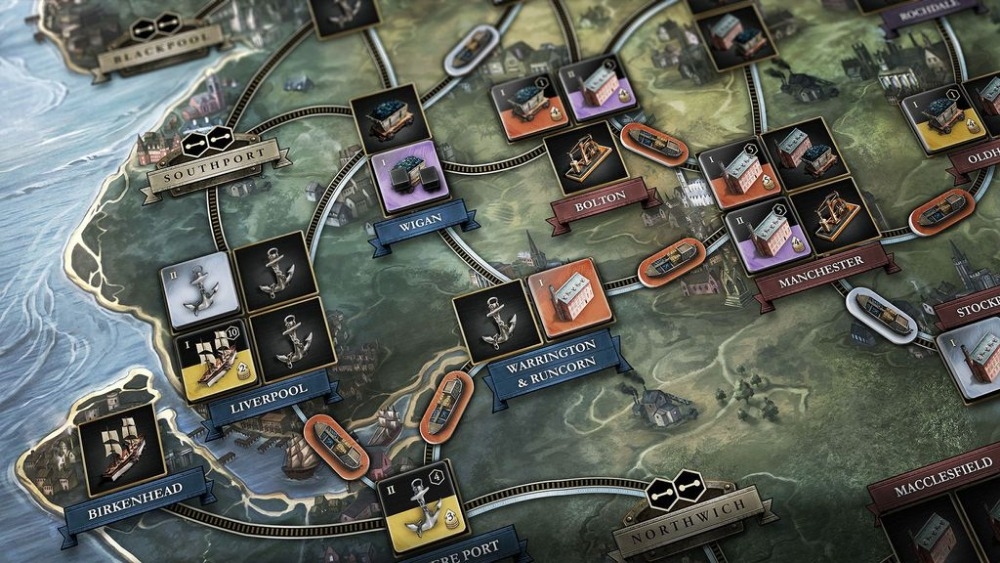XVIII century. Black clouds hover over England. And this is no metaphor, nor a reference to typical English weather. The Industrial Revolution has begun and clouds of soot darken the air and lungs of England.
This new edition of Brass it sure is a valuable new edition of a game that absolutely deserved a new edition. O Brass The original turned ten years old in 2017, but the game, by Martin Wallace, still ranks twenty-fourth on BoardGameGeek at this point (update: Brass: Lancashire at 23rd and Brass: Birmingham at 16th). Not bad for a time when there are so many releases that most won't even be remembered ten years from now.
Two new editions by Roxley are a great opportunity to review this modern classic. technically, Brass: Lancashire is a new edition of the original Brass. Brass: Birmingham is best defined as a spin off. However, the two games have such similar rules and theme that we decided to put them in a review only and highlight the differences.
Smoke over Northern England – Brass Rules: Lancashire
Brass: Lancashire is an economy and logistics game. In the primeval years of the Industrial Revolution, players embark on a quest to build their own factory empires and transport routes between them. Given the game's strategic depth, its fundamentals are remarkably simple.

The game consists of two eras, the Age of Canals and the Age of Railways. In each era, you play with the same stack of cards until the player's stack and hand runs out. At the end of each era, you score for your industries and your transportation network. On each turn, two cards are played from the hand to cause two actions. That's it. How to use these two actions to maximize your points is the question, then your head starts to fry.
The most obvious play and the most obvious way to score is by building industries. This is the only action where what the card shows is important. The cards show either a city, which will allow you to build any type of industry in it, or they show a type of industry that you can build in any city in your network of connections.
Building industries is not free. You pay with cash from your reservation only. Coal and iron are much more interesting. A part of the industry you build are coal and iron mines. You put a certain amount of orange or black cubes when you build an industry. When you build something that needs coal or iron, you have to use it. Iron is used in relatively small amounts, which means transport isn't too much of a problem and you can consume these cubes from anywhere. Coal, however, is used on a large scale, which means you can only use it through the proper transport routes (see below) and for efficiency reasons you have to get it from the nearest supplier.

This part of getting coal from the nearest supplier is a crucial point of Brass, as by doing so, you are doing your opponent a huge favor. When the last cube of a tile of industry is used, you must turn it face down. Only now is he worth victory points at the end of the era. A clever opponent can force you to use his coal instead of your own if he can guess your plans.
Transport is essential, so your second course of action is to build canals or railways, depending on the era. For any letter and some money you can build a single transport connection. In the era of railroads, you can build two connections at the same time, paying a much higher price in cash. Most connections support canals or railroads, but some can only be built either as canals or railroads and are not available in the other era. Connections are necessary to expand your transport network and to move coal to where it is needed, but they are also very cost-effective. Each industry turned at each end of the connection makes it worth points. And it doesn't matter whose industries they are. Just remember that you'll have to build multiple connections twice: the canals are removed at the end of the Age of Canals and you start the Age of Railways blank, in terms of transport.
However, coal and iron are not the only things your industry produces. Cotton is a good deal too, and since there are no cotton cubes, the way to turn the tiles of Cotton Factory is another. As an action and discarding any card, you can sell cotton from your Cotton Factories and tap them immediately. All you need is a connection from the Cotton Factory to a tile of port. If the port is not already tapped, you can sell it and tap it too, even if it belongs to another player. Or you can sell in the Far Market, but with each sale there, demand drops, until the market closes.

The next action is to develop your industry. All types of industry come at different levels. You unlock higher levels by building lower ones or by developing, i.e. removing low level tiles from the game. Higher level industries are more expensive to build, but also more profitable. So developing is an investment in the future. Also, all tier 1 industry tiles are removed from the board at the end of the Age of Canals and you won't be able to build that old junk in the Age of Railways.
And finally, as an action, it is possible to take out a loan: Take some money, but reduce your income, such as interest. the money in Brass is handled simply and quickly. It is not necessary to count all your tiles on the board when collecting income. Whenever you see a tile industry, you adjust your income counter, when you collect income you simply look where the marker is and take a handful of money chips.
the money in Brass it is also used to determine the order of players. All the money that each player spent during their turn is counted and whoever spent the least will be the first to play on the next one. Simple, but with a profound strategic impact. Do you want to be first in the next turn? All right, just don't do anything expensive now. What a simple decision, huh?
I wonder what happened in the shire - Differences from old editions
There's not much new here, the rules are basically the same as the old editions of Brass for Brass: Lancashire. Some details have changed, and for the better, in my opinion. Liverpool and Birkenhead are now two completely separate cities. That weird half-connection that allowed you to build on one if you were connected to the other, but didn't allow you to transport coal, is gone. Another change is regarding the deck preparation for the game. The old rules made you remove random cards to make the deck fit the number of players. The new rules remove specific cards, for a more deterministic game. And finally, the rules now work for two to four players, you no longer need to create your own rules to play with two.

Welcome to the Midlands – Brass: Birmingham
The basic rules are the same as for Brass: Lancashire and Brass: Birmingham. Beyond the basics, however, you find several differences worth mentioning. For starters, there are no more ports and shipyards. Just look for Birmingham on a map, no explanation needed. Instead, there are potteries, manufactures of indeterminate goods (let's imagine they are mugs) and breweries.

Manufactures and potteries are similar to cotton factories: To flip them you must use a sell action. You can even sell from different types of industry for a single share. Beer, on the other hand… Beer is different. Since there are no more ports or distant markets to saturate, there had to be another limit on how much you could sell. The limit is beer.
Whenever you sell cotton, mugs or pots (from pottery) you need to supply beer. Breweries are similar to coal and iron mines. When you put a brewery into play, you put a certain number of barrels on the tile, which you consume for the sell actions. When you sell goods, the beer you need can come from your own breweries wherever they are, or from opponents' breweries if they are connected to your network. A third option is to consume beer provided by the merchant you are selling to. You even get a bonus when you do this, a reward for selling early in one of the eras.
What to do in Northern England on a rainy weekend – The verdict
Undoubtedly any edition of Brass is an excellent economy game. The flow is quite simple and well structured, but the amount of options and their long-term consequences make any decision, from the first move, interesting and important. However, Brass flows fast thanks to the turns of just two actions. You will have to wait for the other players, but never to the point where you can think about what you could play while you wait.
What determines a large part of how engaged you remain in the game is how important the actions of other players are to you. Interaction is what always caught my attention in Brass. Not the interaction in terms of trading and forming alliances, nor the interaction of the kind you find in auction games. One term I've heard to describe this is aggressive cooperation, and I think it fits perfectly. Watch what no one is building and make it your niche. Build iron mines when no one else has it, so it is cheaper for others to buy iron from you than to build your own mines. Make them offers they might refuse, but it's just cheaper to accept. This means that there is no such thing as a winning strategy. Watch your opponents, react to their actions, take a few more points from them than they can handle. Reaction is the word.
This has always been true for the game that now bears the name in Brass: Lancashire, and also for Brass: Birmingham. The two games are similar enough to let you learn to play the other in five minutes. But they are also different enough that you have to invent new strategies. Changing ports and market saturation for breweries and beer to limit their sales is very important.
The question is: If I have one Brass, do I need the other? I really want to say yes, because both games are brilliant. But, to be honest, the answer is: only if you play a lot. If you play Brass every now and then, then either one will entertain you for quite a while. If you find yourself playing Brass every week, then buying the other game will definitely be worth it. More of what you like, but different enough to keep you hooked.
Finally, a word about Roxley Editions. Our review is based on the Kickstarter Deluxe version of the games, and that poker chip-style cash chip is extremely pleasant to handle. There are some other differences in the components, but the version to be released in Brazil is great too, both have a lot of beautiful illustrations. It takes a lot of work to make a map-style board and city and industry cards look this good. The box illustrations are also among the best I've seen.
This new edition of Brass sure is a valuable new edition of a game that absolutely deserved a new edition.
Translated and adapted by Bruna Petrocelli from:
https://www.meoplesmagazine.com/2018/11/12/brass-lancashire-birmingham/






8 thoughts on “Brass: Lancashire & Birmingham”
I've been looking for this game to buy for a long time and I can't find it. Will you no longer sell this model in PT BR?
We will have news from Brass soon!
I bought it used, in excellent condition, at Ludopedia. Hug!
Good morning!! My name is Rodrigo and I really like the Brass line of games!!
Is there a date for Brass Birmingham to be sold again? Certainly, besides me, there is a large group of people who are eagerly awaiting an opportunity to buy the new game.
Either way, I wish Conclave much success.
We will have news from Brass soon!
Hey, any news about a possible new edition of the game? I suppose that with its consolidation as 1st in the BGG rankings, people will be interested in trying the game. I believe that the fact that it is basically out of print all over the internet is testament to this interest.
We will have news from Brass soon!
Play the game on what date there will be new print runs, lol. I want to buy both.